Episode 34: Color Lines

This week, we have updates from the front lines of the battle over immigration policy. An African immigrant tries to cross into Quebec, nearly freezing to death in the process, and a Syrian family just barely skirts a travel ban to come to Connecticut. We also try and answer two tricky questions: Why is Vermont so very white, and whatever happened to Boston’s Black renaissance? Plus, the climate’s getting warmer. Can we start our seedlings yet?
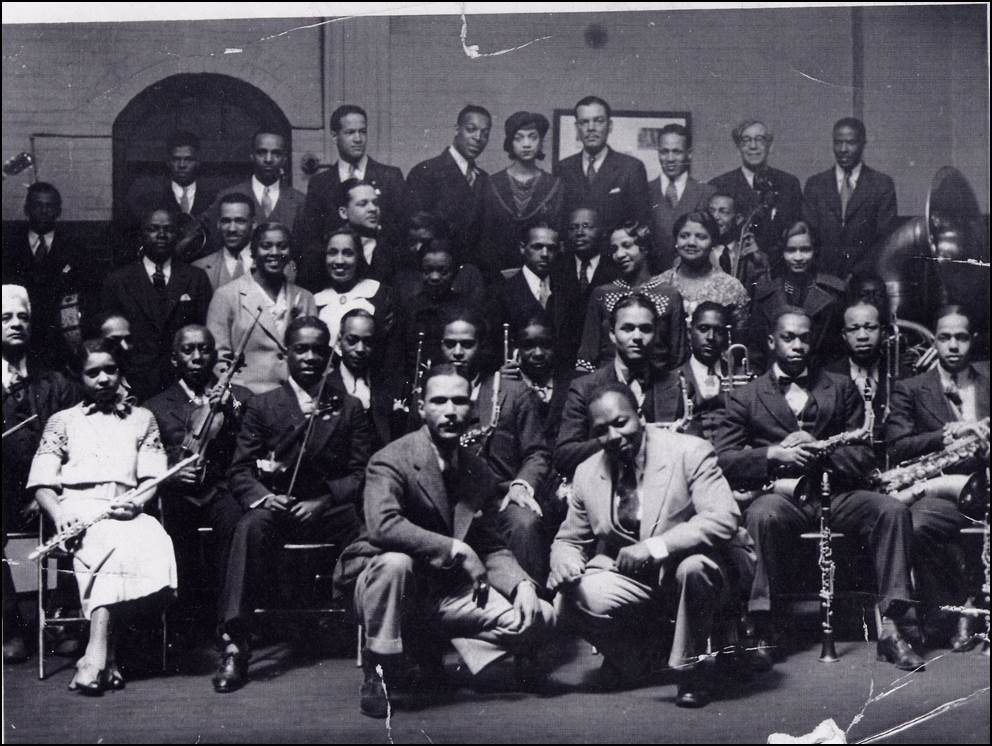
Members of the Boston Unit of the Federal Theater Project. A program of the New Deal, the FTP supplied federal funding to provide relief to professional artists during the Great Depression. Photo courtesy of the Mason/Quarles Collection for Black Bostonians and the Politics of Culture 1920 -1940
Frozen Out
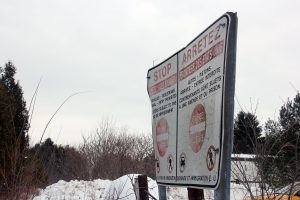
This sign marks the Canadian side of the border at one rural area where many people are crossing illegally into Canada. Photo by Kathleen Masterson for NENC
Many recent immigrants living in the U.S. are scared that their claims for asylum won’t have a fair hearing by the Trump administration. Hundreds are fleeing to Canada.
As we’ve reported, many migrants are heading straight to illegal border crossings, knowingly walking into arrest, for a chance to make their claims in Canada. This week, we have the story of a man who was turned away at an official border checkpoint, but tried to make it into Canada anyway, with disastrous consequences. From Vermont Public Radio, Kathleen Masterson reports.
If the last few months has been confusing and concerning to those seeking asylum here, it’s also thrown the process of resettling refugees into chaos. Courts have twice blocked the administration’s executive orders imposing a travel ban on visitors from a group of majority Muslim countries. The judge’s orders — at least temporarily — lift a cap on refugees.
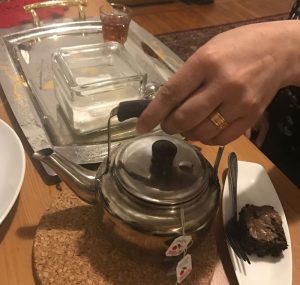
Mona’s tea service was one of the only non-essential items she was able to pack when she left Jordan last month. She serves tea and brownies to guests in her new apartment. Photo by Kaari Pitkin for WNYC
The Connecticut-based nonprofit resettlement group IRIS said this week that new refugee arrivals are being booked, at least through April 28, although that’s subject to change.
WNYC reporter Kaari Pitkin has been following the story of one family that just arrived in Connecticut.
Read and listen to more immigration stories from the New England News Collaborative series Facing Change.
And if you’re in the area, join us Monday for our next discussion of what makes a sanctuary city at Gateway Community College in New Haven, Connecticut, moderated by NEXT host John Dankosky and WSHU reporter Cassandra Basler. The event starts at 5:30 pm and is free and open to the public. Find out more.
#VermontSoWhite
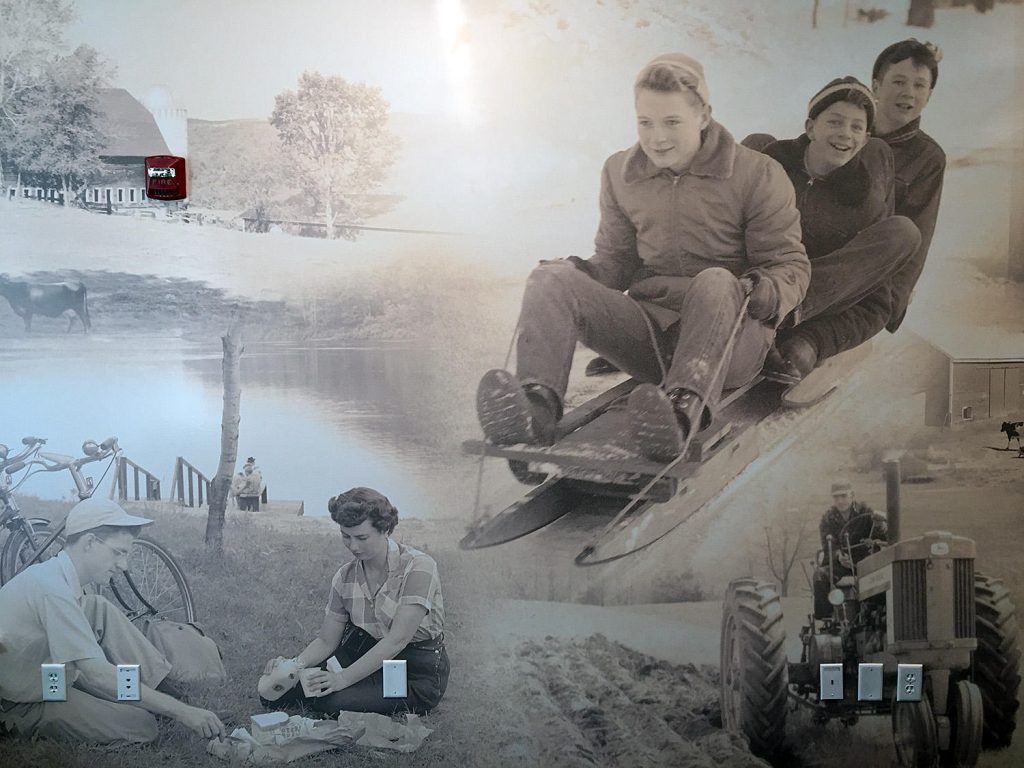
A mural in a meeting room at the town offices in Hartford, Vermont portrays familiar images of the “typical” Vermonter. Photo by Angela Evancie for VPR
Last week we learned about the tradition of town meeting in Vermont, where residents hash out their differences to pass a budget and come up with local laws. But one thing most town meeting attendees, and most Vermonters, have in common is skin color. As of the 2010 census, the state was over 95 percent white.
The whiteness of northern New England states is a reality many of us take for granted. Not so Brave Little State, the podcast from Vermont Public Radio that digs deep to answer listeners’ questions about the Green Mountain State. Their most recent episode takes up the question “Why is Vermont so overwhelmingly white, and how does that affect all of us?”
We’re thrilled to welcome Brave Little State host Angela Evancie back to NEXT to discuss her findings. (We highly recommend you listen to Angela’s original podcast episode, too.)
Black Bostonians From the Jazz Age to the New Deal
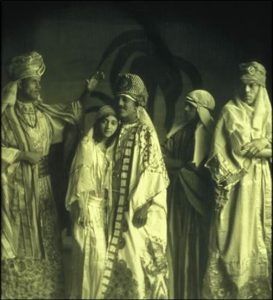
A staging of the play “Antar of Araby” by Maud Cuney Hare, 1930. Courtesy of Thelma Thorton Wynn for Black Bostonians and the Politics of Culture 1920-1940.
Today, African Americans make up about 28 percent of Boston’s population. But in the 1920s and ’30s, they were only about three percent.
Opportunities to gain political power were limited, but black Bostonians left their mark through the arts. It’s a period that mirrored the Harlem Renaissance in New York, but had its own distinctly Boston flavor.
This period had also been largely overlooked, until now. Our guest Lorraine Elena Roses is the author of the new book Black Bostonians and the Politics of Culture 1920 -1940.
Is It Spring Yet?
Those early hints of spring can call to a gardener like a siren song. Yet the urge to get one’s seeds into dirt can be dangerous: most seedlings won’t survive a single frost. To help with that, gardeners use 30-year averages that predict when the last frost will probably occur. The thing is, in New England, climate change has temperatures rising relatively quickly. That left New Hampshire Public Radio reporter Emily Corwin with a question.
About NEXT
NEXT is produced at WNPR.
Host: John Dankosky
Producer: Andrea Muraskin
Executive Producer: Catie Talarski
Digital Content Manager/Editor: Heather Brandon
Contributors to this episode: Kathleen Masterson, Kaari Pitkin, Angela Evancie, and Rebecca Sananes
Music: Todd Merrell, “New England” by Goodnight Blue Moon
We appreciate your feedback! Send praise, critique, suggestions, questions, story leads, and anecdotes to next@wnpr.org.
